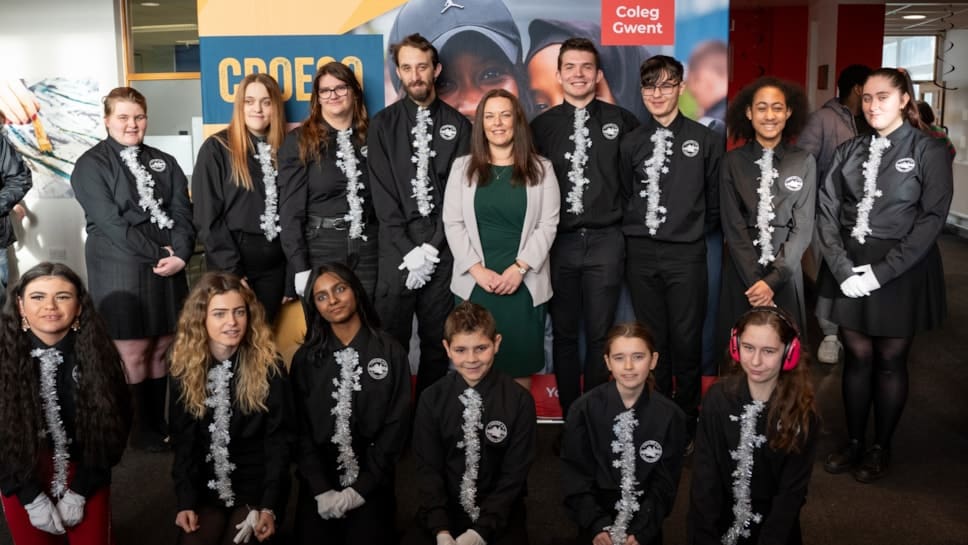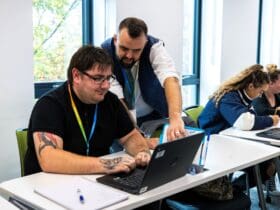At Coleg Gwent a group of hearing-impaired learners are developing independent life skills through individually tailored support.
On a visit to the Newport campus, the Minister for Further and Higher Education, Vikki Howells, met staff and learners from the Cwmbran D/deaf Choir and had the chance to see their Christmas choir concert.
Over the past four years hearing-impaired learners from Cwmbran High school have been a part of the Deaf Club at Coleg Gwent, helping to build their confidence and supporting their transition from school.
The college has a strong partnership with Elite training who support learners in their transition to employment.
Vikki Howells said:
“The Deaf Club at Coleg Gwent is an inspiring example of how learners with additional learning needs are thriving in mainstream education, thanks to our person-centred approach.
“The reforms we’re implementing in Wales are aimed at achieving the systemic change in culture and practice that’s needed to ensure all our children and young people can reach their full potential.
“I’m so pleased to see Local Authorities, schools and colleges are working hard with learners and their families to ensure they get the provision they need to thrive, working with outside agencies and health boards.”
Coleg Gwent is deaf friendly, and staff are deaf-aware. Learners with hearing impairments, ranging from mild to profound who use hearing aids and cochlear implants, receive tailored support in British Sign Language (BSL) and Sign Supported English (SSE). In 2023-24 78 learners at the college stated hearing impairment as an additional learning need.
As well as enabling hearing-impaired learners to access their learning and reach their full potential, the college supports work experience for learners through the local charity Elite, who provide disabled and disadvantaged people with vocational opportunities, training and employment.
As well as improving learners’ confidence, Elite provides supported apprenticeship schemes leading to successful outcomes for learners when they leave college. Elite staff attend Deaf Club meetings, so learners see a familiar face as they move into the world of work.
Nicola Gamlin, Principal at Coleg Gwent, said:
“We were delighted to welcome Vikki Howells, Minister for Further & Higher Education to Coleg Gwent to witness the incredible talents of the Cwmbran D/deaf Choir. This inspiring performance is an example of how learners with additional learning needs are thriving both in college and beyond.
“At Coleg Gwent, we are passionate about creating an inclusive environment where every learner is supported to achieve their full potential. Seeing the talent celebrated today makes me feel very proud of what our learners have achieved, and we’re pleased to be able to share this with the Minister.”
It’s not just in Gwent where learners with additional learning needs are being supported in the transition to their next stage of learning. Grwp Llandrillo-Menai in North Wales has been building close relationships with local schools to support learners with ALN.
Sharon O’Connor Head of Additional Learning Needs at Grŵp Llandrillo Menai explains how the ALN system promotes collaboration and communication:
“This is a system where we can identify the student’s aspirations, the aspirations of the parents, and how we cooperate with schools. The teachers are integral to this, sharing information on what’s needed in the future.
“Cooperating with external agencies and local authorities has been essential and at the heart of everything we have done as an ALN team. We strive to create close relationships so that communication is clear, early identification, and that everyone is comfortable to have a conversation about young people”.
The ALN system implemented in September 2021 has been gradually rolled out across Wales creates a single legislative system supporting children and young people aged 0-25, replacing the Special Educational Needs System (SEN).
Alongside the ALN reform, the Curriculum for Wales offers schools and colleges more flexibility to teach in a way that best meets the individual needs of each child, breaking down barriers to provide excellent educational opportunities and outcomes for all learners.
Since 2020, more than £107m revenue funding has been invested to support the implementation of the ALN system and £60m capital funding has been provided to local authorities in Wales to improve facilities and infrastructure for all learners, including those with ALN.









Leave a Reply
View Comments